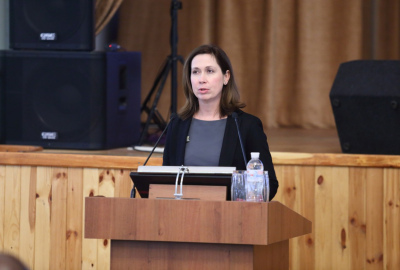The issues of strategic communications, information operations and the NATO role in hybrid threats counteraction is discussed by the XІХ International Week participants at the NDU
- Головна >
- The University >
- News >
- The issues of strategic communications, information operations and the NATO role in hybrid threats counteraction is discussed by the XІХ International Week participants at the NDU

The International Week continues at the National Defense University named after Ivan Chernyakhovskyi on "NATO beyond the Brussels Summit and Challenges of the 21st Century." The event was organized jointly with the NATO Defense College (Rome, Italy) and the NATO School (Oberammergau, Germany).
During the International Week the lectures for the University students and representatives of educational institutions of Ukraine's security sector are conducted by NATO experts and officials, who are directly involved in shaping the organization's policy.
The lecture on the Russian Federations approach to the conflict was presented by Mr Dave Johnson (USA C), NATO International Staff Officer. He presented the NATO view on the strategic goals of Russia and the ways to achieve those goals, escalation risks, inherent to russian approach to the conflict.
An invited expert from the NATO Defense College research department, Dr Mark Ozava, who is an expert on energy policy and Russian-Eurasian relations, gave his assessment of how the oil and gas industry influences geopolitics in Europe and Russia and the possible implications for Ukraine.
Lieutenant Colonel Lieutenant Colonel Eric Pinczon du Sel (FRA A), Course Director and Instructor of the NATO School, conducted a review of NATO Strategic Communications (StratCom) and Information Operations (InfoOps) policies and their benefits in combating the hybrid war. He informed the participants of the event about the Strategic Communication and Information Resources concept of the Alliance.
The lecture of the NATO Information and Documentation Center in Ukraine Director, Barbora Maronkova, on the role of the Alliance in combating hybrid threats was substantive and relevant. The lecture focused on key NATO strategies: training, deterrence, protection.






































